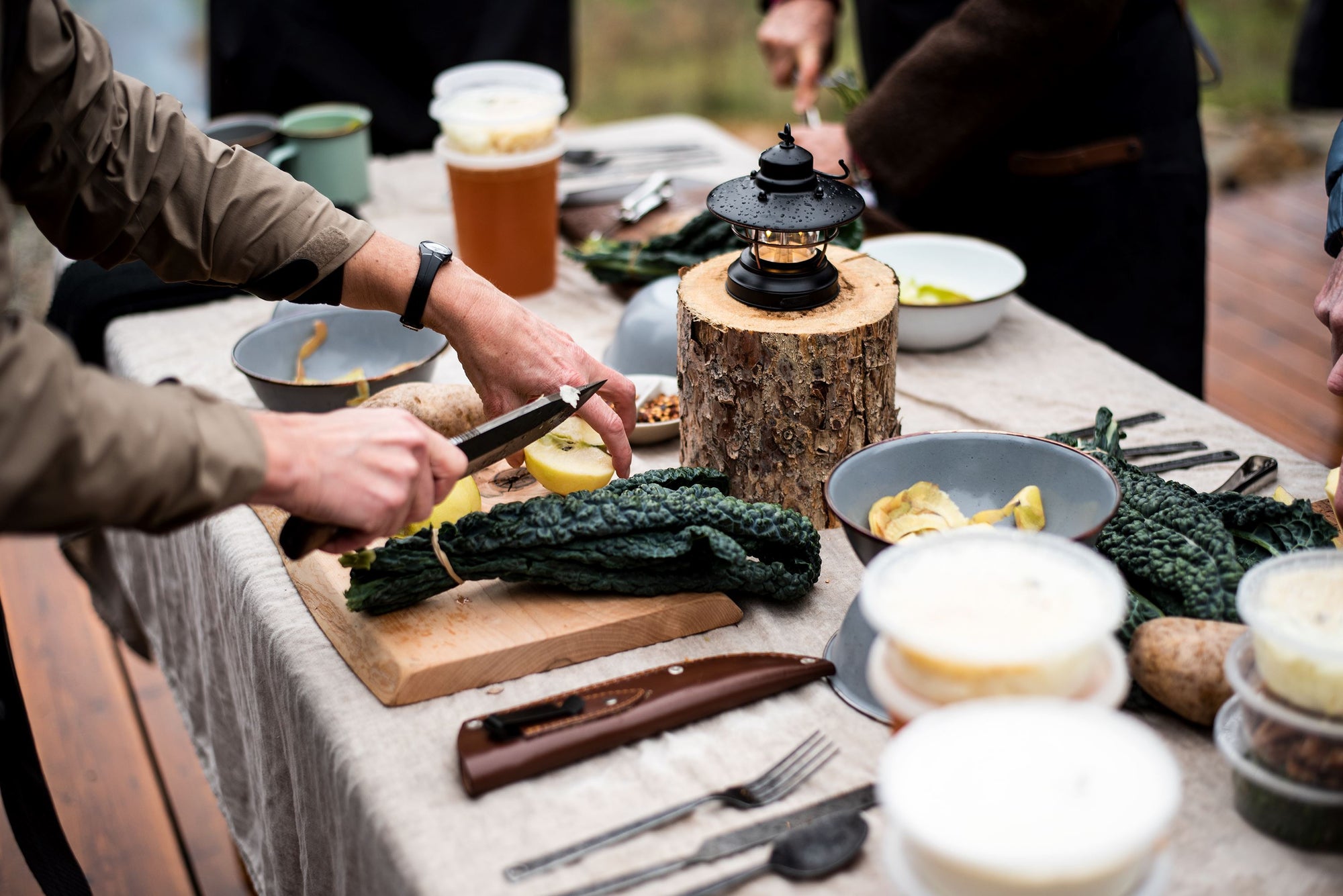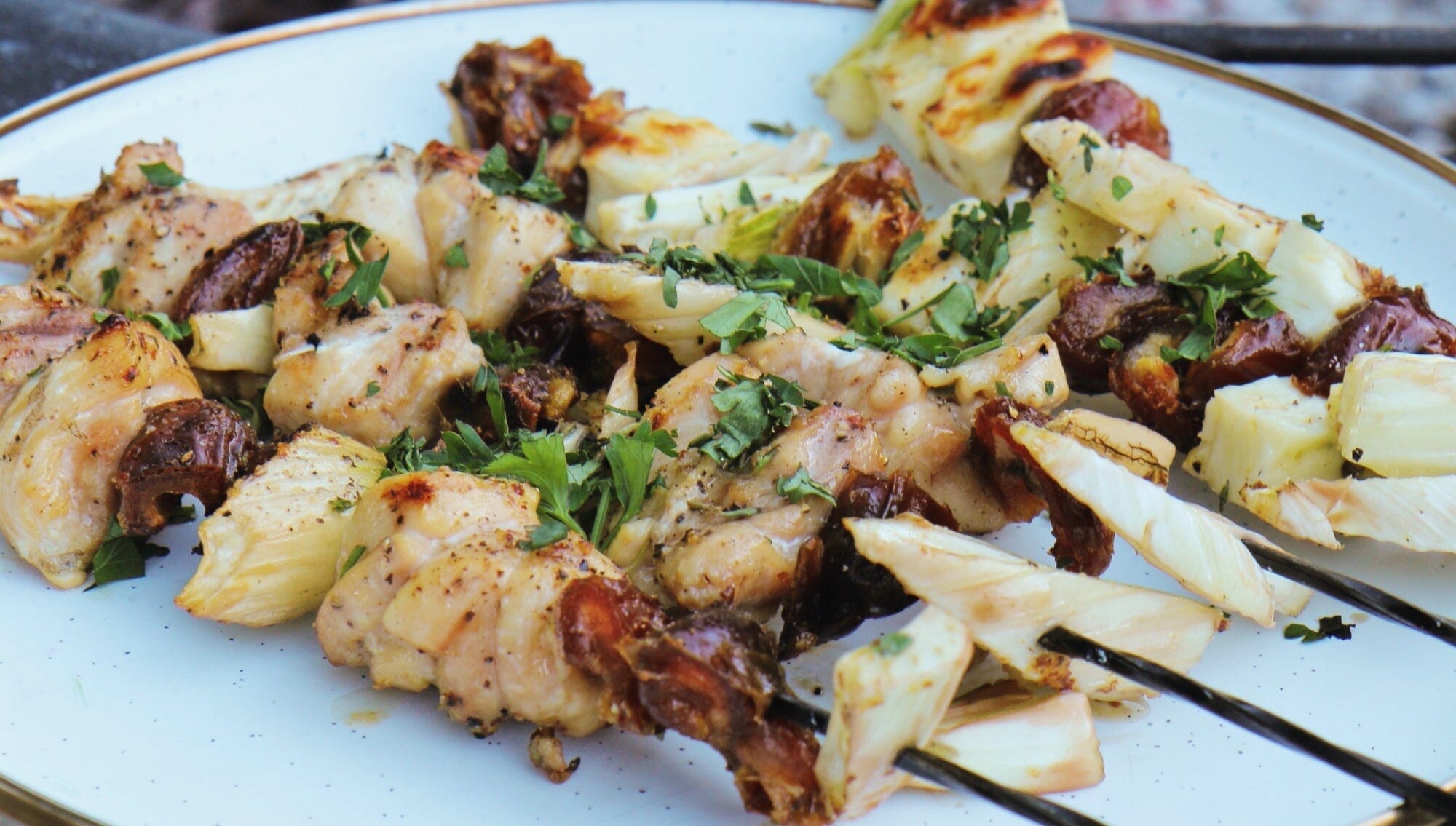Photos & Tips By Brianne Dela Cruz
Over the years, my husband and I have cooked outdoors in both commercial and private outdoor recreation settings. Every cooking experience outside presents different challenges and teaches us something new. Each time we cook, we refine our processes and cultivate a deeper understanding of the craft.
In the recent outdoor cooking class that we taught at Maple Grove Hot Springs, we were both thrilled to pass along our knowledge and morsels of advice to students of all levels of experience. Here are five outdoor cooking tips that will benefit any aspiring outdoor cook.

Prepare ingredients in advance at home
Preparing ingredients in advance at home is one of the most important ways to simplify and streamline an outdoor cooking experience.
Cooking outdoors is a lot of work. There are a lot of variables that can impact how well the food cooks when you are working out in the elements. It can quickly become an overwhelming task to manage fire, prepare ingredients, and cook with the right timing.
I always start with a pre-planned menu, then prep and portion out most ingredients before leaving. The only ingredients I pack whole and prepare on-site are the ingredients that need to remain the freshest, such as tender herbs or greens. Doing this frees up my time to focus on managing the fire and cooking the ingredients exactly how I want, so dinner turns out as planned.

Cook in a dutch oven over coals
I always recommend that beginners start their outdoor cooking journey by cooking a meal in a dutch oven or cast iron skillet over coals because the cooking process is simple. It is a lot easier to control temperature and heat distribution by adding, removing, or redistributing hot coals than trying to manage food over an open flame. Cooking over an open flame is more of an advanced technique that requires a nuanced understanding of how heat moves in a fire and how fast that heat cooks food outside in the elements. That deeper understanding comes with time and a lot of experience standing over a fire.Start with easy recipes such as stews, casseroles, and soups
We love the process of tossing a bunch of fresh ingredients into a dutch oven, setting it over coals, then forgetting about it for an hour while it cooks itself. It just makes camp life so simple and allows free time without slaving away in the camp kitchen after a long day outside. Simple recipes can be incredibly flavorful and filling. They are a great place to start for beginners. Pick a simple recipe and shop for delicious, high-quality ingredients. (This way, your dutch oven dinner is sure to be a crowd-pleaser without all the stress!) Starting with simple recipes is a great way to get familiar with cooking outdoors. Before you know it, you’ll be ready to move on to more technical recipes over the fire.

Looking for easy dutch oven recipes? Try Cottage Pie, Hama Hama Two Clam Stew, Chanterelle Chowder with Bacon, or Dutch Oven Nachos
Be prepared for bad weather
Every cooking experience outdoors is different, and weather patterns can flip on a dime. Be prepared for varying conditions such as wind, rain, snow, humidity, and even cold ground temperatures. Always remember to pack snacks in the event of unpredictable weather that could delay or prevent your cooking experience.
Wind stimulates fire, which can cause coals and wood to burn too rapidly. Be prepared to set up a wind barrier to protect the fire from burning through your resources too quickly. In a pinch, we’ve used foil wrapped around a grate, stacked rocks, or even set up old cookie sheets. When the ground freezes during winter, plan for a much longer cook time (which increases the number of resources needed). Add a barrier between the heat and the ground, or cook above the ground using the All-In-One Cast Iron Grill. Rain and snowy conditions require protection overhead. Choose a cooking area that offers natural protection or rig a tarp for shelter with plenty of room for smoke to flow away.
Practice a recipe with your gear at home before leaving town
Even though I am very confident cooking in different outdoor environments, I still test a new recipe at home first. I also do this when adapting well-loved recipes to an outdoor cooking scenario. Testing is an ideal way for beginners to get the hang of cooking with cast iron over a fire in a familiar environment and when the conveniences of a kitchen are close at hand. (I can’t tell you how many times during a practice run I’ve had to run back inside to grab a utensil or ingredient I didn’t anticipate needing!) After cooking the meal in a camp setting, I’m always glad I did a practice run to work through the kinks and get familiar with the recipe and the gear.
ABOUT
Brianne Dela Cruz is a master gardener, wild forager, campfire foodie, and acclaimed writer and photographer. From her home in Salt Lake City, she teaches online gardening and foraging courses for modern folks and budding naturalists as well as hosts seasonal community gatherings. Brianne's blog and online school, Gather & Grow, is a community of folks exploring the intersection between nature and personal growth by discovering ways to slow down and nourish themselves with nature.


